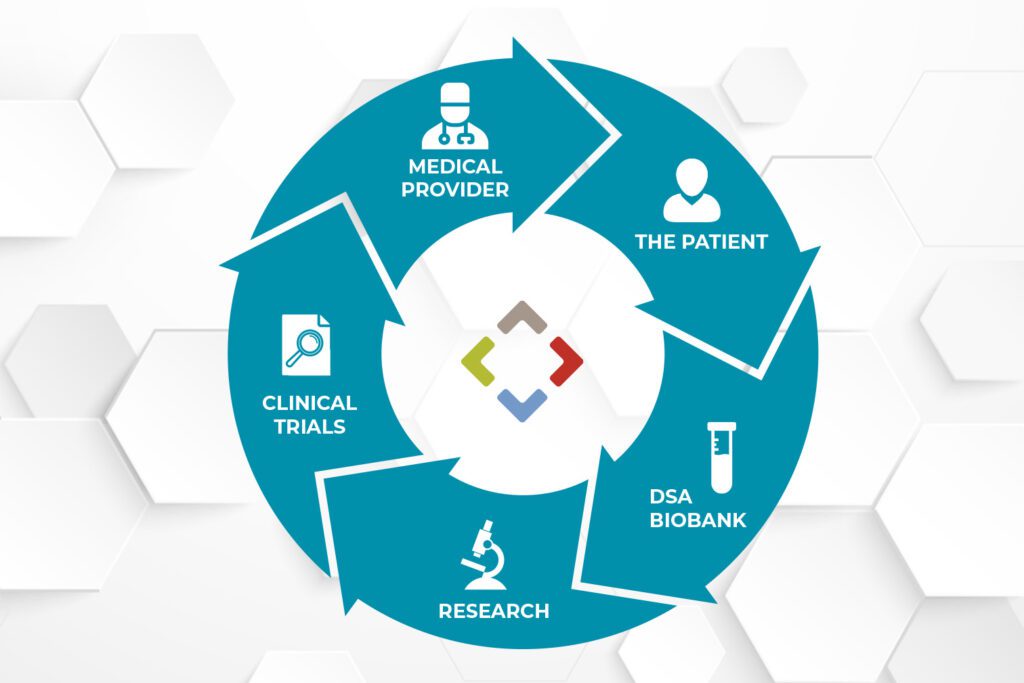How the DSA Biobank Supports Research
The DSA biobank collects biospecimen samples from individuals with Down syndrome and their families. These samples are a valuable resource for supporting scientific investigations into understanding the genetic basis of Down syndrome, learning about associated health conditions, identifying potential biomarkers, and exploring potential therapeutic targets. Biobank samples contribute to the discovery of understanding underlying mechanisms (biological and genetic) that impact people with Down syndrome which can then lead to important drug discoveries, medical interventions, and more options for treatment.
Who benefits from the use of biobank samples?
In short, everyone benefits. All parties are positively impacted, from the research participant to the researcher, the clinical researcher, the medical provider, and back to the patient. Everyone in this process benefits from the discovery, learning, and ability to apply new interventions and treatment options for patients.

A Biobank sample repository can be essential to clinical trials and intervention studies to test treatments and medical interventions for common conditions affecting the Down syndrome population. Individuals with Down syndrome and their families benefit from the translation of these research findings into clinical practice. The DSA Biobank aims to serve as a vital resource providing access to high-quality samples for Down syndrome research, advancing biomedical and scientific understanding, improving diagnosis and treatment options, and ultimately contributing to improved healthcare outcomes, enhancing and enriching the lives of individuals with Down syndrome and their families.
What is biobanking?
Biobanking is a centralized location where samples collected from research participants are processed, stored, and cataloged for research purposes.
A type of repository that stores various types of samples
Animal, plan, and human
A place where samples are collected, processed, stored, and catalogued
Animal, plan, and human
Biobanks are emerging sources
Independent collection->Population based
Simple->Complex
What types of samples are stored in a biobank?
Various types of samples can be stored in a biobank. For example, a tube of blood can be processed, and by-products of blood, such as DNA, RNA, plasma, and white blood cells, can be isolated and stored in the biobank. Each of these by-products helps researchers to understand a different aspect of the biological and genetic conditions for which they are trying to understand. Other samples that can be collected in a biobank are hair, tissues, feces (stool), urine, and saliva. These are just a few sample types that can be stored in a biobank for researchers to access, study, and analyze.
Why is biobanking important for Down syndrome?
Currently, no general or open-access biobanks are available for researchers interested in studying Down syndrome specifically. DownSyndrome Achieves aims to reach that goal by creating, supporting, and maintaining the world’s first biobank of its kind. Down syndrome research funding is also starting to increase. With increased access to funding, researchers need increased access to samples for their research studies. Without the resources they need, such as biobank samples, research progress will stall. Further, the time and effort it takes for an individual investigator to recruit, consent, and collect samples from research participants for their study can slow the process down. DownSyndrome Achieves wants to help researchers by saving them time and providing access to a biobank of samples specific to people with Down syndrome and their direct family members. Our goal is to create momentum and awareness for families about research initiatives so they may become more engaged in research and help move the needle forward in understanding the health conditions that impact their loved ones with Down syndrome.
Have additional questions?
Visit our researcher FAQ page.